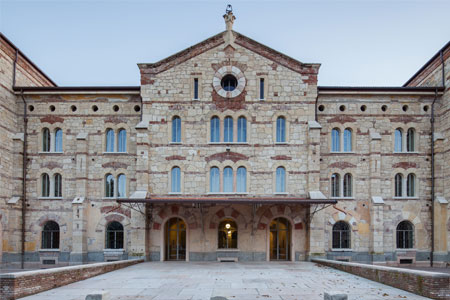|
CSR, sustainability and business ethics
standard compliant
Scimago
|
| Accountability to the community |
Chiara Leardini
Sara Moggi
|
Study of discharging accountability for organizations that focus their activities of public interest (e.g. water managers, foundations, hospitals) and need to be accountable for their actions to the community they serve. Analysis of several aspects related to accounting and accountability responsibility such as migration; the use of natural resources (e.g. water, soil); human rights; the environment (e.g. forests, animals, smart cities); for health (public and private). Observation of the wide range of tools for stakeholder engagement through the use of qualitative methods (e.g. focus groups, interviews). |
| Consumer attitudes and behaviours toward sustainability. |
Federico Brunetti
Valentina Mazzoli
|
Identification of the consumer as a key actor as regards environmental, social and cultural sustainability. Survey about consumer attitudes and behaviours, with a focus on the industry of disposable plastic tableware and on e-commerce. |
| ISO 14001, ISO 45001-SA8000 certifications |
Andrea Chiarini
|
Developing CSR models using international standards in private and public sectors. Risk Management |
| Environmental and rural economics |
Elena Claire Ricci
Riccardo Scarpa
|
Forest economics and policy, models of outdoor visitation and destination choice, economics of conservation of iconic and rare species in commercial forests, conservation policy and ecosystem services from rural areas, sustainable food production and local and diffuse pollution reduction. |
| Energy efficiency and sustainability |
Federico Testa
|
Study of energy efficiency as a driver of sustainable development. Application of the energy efficiency gap model to the Italian context. Use of qualitative research methods to identify the main barriers to industrial energy efficiency investments, in particular among SMEs. Definition of strategies aimed at promoting a more efficient energy consumption behavior among citizens. |
| Virtue ethics in business |
Giorgio Mion
|
Examination of the role of decisional capabilities of managers and entrepreneurs (practical wisdom) on ethical management, based on theoretical framework of the so-called Humanistic Management. Analysis of managerial theories and practices in the light of Virtue Ethics and Common Good Theory. Analysis of the impact of spiritual capital and relational capital on development of managerial practical wisdom. Qualitative research methods and theoretical discussion. |
| Managerial ethics and models of “feasible ethics” |
Elena Giaretta
|
Study of attitudes, perceptions and behaviours of managers in relation to ethical issues. Collection of expectations in relation with the choices of the organization. Use of focus groups, interviews, anonymous questionnaires to collect managers’ perceptions about ethical issues, organizational position and personal role. Study and assessment of a model of sustainable ethics for the firm. Use of cross-disciplinary analyses based on philosophy and psychology. |
| Evolution of the firm-market relationship |
Federico Brunetti
|
Diachronic and synchronic analysis of the change that took place in the way firms address the market. Examination of environmental, social and cultural consequences deriving from the most recent Marketing approaches. Formulation of possible alternative approaches. |
| Fair trade |
Francesca Simeoni
|
Study of the development of fair trade in Italy and in the world. Analysis of business problems (business models), distribution channels and consumer behavior. Case studies, benchmarking analysis, content analysis as well as continuous updating of information with interviews and focus groups. |
| Sustainability management and reporting in non-profit organizations (NPOs) |
Angela Broglia
Giorgio Mion
|
Analysis of the meaning and relevance of “sustainability” perceived by non-governmental organizations (NGDOs, social cooperatives, foundations, ecc.). Analysis of sustainability practices in NPOs management. Analysis of models and practices adopted by NPOs in sustainability reporting. Qualitative and quantitative research methods. |
| The features of sustainable innovation |
Elena Giaretta
|
Study of sustainability dimensions and assessment of the impact of innovation on sustainability. Identification of the features of innovation that have an effect on sustainability. Identification of the forms of innovation that contribute to the concept of sustainability. Analysis of the ethical dimension of product innovation. |
| Energy Transition |
Giovanni Goldoni
|
Analysis of regulation and incentives used to promote and integrate renewable sources in electricity systems and wholesale markets. Technical and economic evaluation of flexibility options (storage and demand participation) to optimize the operation of electricity systems. Technological and industrial evolution of the automotive sector, with particular attention to fuel standards and emission standards. Research methodology: Case studies. |
| Measuring and reducing the environmental impacts of wastewater treatment |
Andrea Guerrini
|
Study of the environmental impact of the wastewater treatment service, considering the tools for measuring the energy costs of the treatment plants of these waters, aimed at seeking greater efficiency. The method adopted is the double bootstrap analysis, employed to defining the variables with a significant influence on the system and to be used as control indicators in the design of the monitoring the costs and the energy expenditure of the water services. |
| Sustainable business models |
Bettina Campedelli
Silvia Cantele
Sara Moggi
Silvia Vernizzi
|
Deepening of scientific knowledge on business archetypes/models for sustainability, and also the tools which enable their implementation. Specific case studies of firms which have adopted sustainable management practices, created or converted the business through sustainability innovations, or implemented circular business models or inter-organisational forms of cooperation (business networks for sustainability) are analyzed, mainly through qualitative methodologies. |
| Sustainability reporting and non-financial disclosure in for profit organizations |
Bettina Campedelli
Silvia Cantele
Sara Moggi
|
Analysis of the social, sustainability and non-financial disclosure practices within different clusters of firms. The reporting analysis is conducted through qualitative and quantitative methodologies as well as few techniques (e.g., content analysis, scoring, discourse analysis) and place into relationships with firms’ features, their institutional context, the implementation of some kind of practices, and the attainment of outputs/performance results. |
| Research of new firm’s models. |
Federico Brunetti
|
Theoretical analysis of firm’s models to overcome the drawbacks of current forms of organization and execution of entrepreneurial activities. Empirical research of cases of firms that are consistent with these models. Formulation of principles to properly guide the design of sustainable, responsible and ethical entrepreneurial structures. |
| Benefit Corporations and B-Corp |
Bettina Campedelli
Silvia Cantele
Sara Moggi
|
Study of the development of the Benefit Corporation in Italy and comparison with the US experiences. The facilitators and the factors that lead companies to change in the statute have been analysed, as well as the costs and obstacles encountered in this process. Special attention is paid to the integration of the "benefit" dimension into the business model and the development of transparency and reporting tools required by the law. The epistemological approach used involves the use of case studies and field studies supported by data collection through interviews, focus groups, and document collection. |
| Supply chain sustainability and innovation |
Paola Signori
|
Three research projects are active on supply chain sustainability topic: Sustainable supply chain orientation analyses in the fashion and food industries (global wine and dairy supply chains); Research about Innovation on Sustainability (Triple Bottom Line); Research on Sustainability Supply Chain global best practice. |
| Sustainability at universities |
Bettina Campedelli
Sara Moggi
|
Analysis of the different aspects related to the sustainability of universities considering the national and international context. The study embraces the analysis of the tools that enhance greater knowledge of sustainable development within universities. In particular, as a tool of engagement sustainability reporting has been considered as a lever for the dissemination of such knowledge, as well as, an instrument for sharing a sustainable approach and its impacts. Among the various aspects is also explored the importance of education for sustainable development in management and accounting courses, aimed at disseminating, among other things, the 17 goals of the United Nations. Being the field strictly linked to social contexts, it is expected to use focus groups, semi-structured interviews and experimental approach. |
| Valorization and sustainability of the territories |
Francesca Simeoni
|
Study of the different opportunities for territorial development in a sustainable way (from an economic, environmental and social point of view). Analysis of cultural events for the sustainable development and deepening of the ecomuseum realities. Study of the impact and the problems, including also organizational and financing problems. Qualitative research with case analysis and benchmarking and quantitative research with basic statistical analysis. |







